How Stress Hormones Like Cortisol Fuel Procrastination (and What Helps)
Introduction
We often think procrastination is a matter of poor discipline or weak willpower. But neuroscience tells a different story — one that begins not with laziness, but with stress hormones, especially cortisol.
When you feel overwhelmed by a task, your brain doesn’t simply decide to “put it off.” It’s reacting to threat, triggering a physiological cascade that shuts down focus, motivation, and clarity. Cortisol is the chemical messenger behind that shutdown — the same hormone that helped ancient humans escape danger now convinces you that checking your phone is safer than finishing that report.
This article explores how stress and cortisol affect procrastination, what chronic stress does to the brain’s motivation circuits, and how natural supplements and habits can help restore calm, focus, and confidence in your ability to act.
Looking for supplements for This? Click here.
Cortisol: The Brain’s Stress Signal ⚡
Cortisol is produced by the adrenal glands as part of your body’s stress response. When you face a challenge, your hypothalamic-pituitary-adrenal (HPA) axis activates, releasing cortisol and adrenaline to sharpen attention and prepare for action.
In the short term, this system is lifesaving — it makes you alert and energized. But when stress becomes chronic, cortisol stays elevated, and that’s when things start to go wrong:
The prefrontal cortex (PFC) — responsible for planning, focus, and decision-making — begins to slow down.
The amygdala — your emotional threat center — takes over, amplifying anxiety.
Dopamine levels drop, robbing you of motivation and drive.
Instead of springing into action, you feel frozen, scattered, or paralyzed by overthinking. That’s cortisol-driven procrastination in action.
How Cortisol Triggers Procrastination 😣
When you encounter a difficult or uncertain task, your brain subconsciously weighs reward versus risk.
If the task feels too overwhelming — or if you fear failure — your brain interprets it as a threat, even if it’s just a work email or creative project. This activates the stress response, releasing cortisol into your bloodstream.
Here’s what happens next:
Focus narrows — cortisol makes your mind hyper-aware of potential negatives, so you fixate on “what could go wrong.”
Decision fatigue sets in — high cortisol impairs the prefrontal cortex, making it hard to organize thoughts or prioritize.
Reward circuits shut down — dopamine production decreases, so even small wins don’t feel satisfying.
Avoidance feels safe — your brain seeks quick relief, like scrolling or snacking, to lower stress temporarily.
This is why procrastination is emotionally soothing in the short term — avoidance gives your brain a break from threat. But it reinforces the habit loop, making future tasks even harder to start.
The Stress-Procrastination Cycle 🔄
Once the cortisol-procrastination loop begins, it tends to reinforce itself:
Stressful task appears → cortisol spikes.
You feel anxious and stuck → avoidance behavior provides temporary relief.
Guilt or frustration kicks in → more stress, more cortisol.
Increased self-doubt → future tasks trigger faster stress responses.
Over time, your brain learns to associate effort with discomfort. The result is chronic procrastination, mental fatigue, and lower self-esteem.
Chronic Cortisol and the Brain 🧬
Prolonged exposure to high cortisol can literally change the brain’s wiring.
Prefrontal Cortex (PFC): Chronic stress shrinks connections in the PFC, impairing focus, impulse control, and planning — the very functions needed to overcome procrastination.
Hippocampus: The memory center becomes less efficient, leading to forgetfulness and confusion.
Amygdala: Becomes overactive, increasing anxiety and emotional reactivity.
In this state, even small decisions — replying to an email, cleaning your room — can trigger exhaustion or paralysis.
Signs Your Cortisol Is Driving Procrastination 🚨
You might suspect cortisol is part of the problem if you experience:
Frequent anxiety or “mental overload”
Fatigue despite sleeping well
Difficulty concentrating
Restlessness or irritability
Cravings for sugar, caffeine, or salty foods
Nighttime alertness (wired but tired)
These are signs that your body is stuck in sympathetic dominance — the “fight, flight, or freeze” mode.
How to Calm Cortisol Naturally 🌿
The key to breaking the stress-procrastination loop is to regulate the nervous system and lower baseline cortisol levels.
Below are the most evidence-based supplements and practices for restoring calm focus and energy.
Ashwagandha — The Cortisol Tamer 🌱
What it does:
Ashwagandha (Withania somnifera) is one of the best-studied adaptogens for cortisol balance. It lowers stress hormone levels, supports the thyroid, and improves sleep.
Benefits:
Reduces cortisol by up to 30% in clinical studies
Improves focus and emotional resilience
Helps restore dopamine sensitivity
Typical dose: 300–600 mg daily of standardized extract (withanolides 5%).
Best time to take: Morning and/or early evening.
Phosphatidylserine (PS) — Calms the HPA Axis 🧘
What it does:
PS helps regulate the brain’s stress response by blunting cortisol release after mental strain.
Benefits:
Lowers stress-induced cortisol spikes
Enhances memory and concentration
Promotes better sleep recovery
Typical dose: 200–400 mg daily, often taken in the evening.
Looking for supplements for This? Click here.
Magnesium Glycinate or Threonate — Relaxation Mineral 🪶
What it does:
Magnesium calms the nervous system by regulating GABA and serotonin activity. It also reduces cortisol and supports mitochondrial energy.
Benefits:
Improves relaxation and sleep quality
Decreases anxiety and irritability
Reduces muscle tension from chronic stress
Typical dose: 200–400 mg daily (preferably in the evening).
Rhodiola Rosea — The Mental Endurance Herb 💪
What it does:
Rhodiola is an adaptogen that supports cortisol balance while enhancing mental energy and resilience.
Benefits:
Reduces fatigue and burnout
Increases dopamine and serotonin levels
Enhances focus under pressure
Typical dose: 200–400 mg standardized to 3% rosavins, 1% salidroside.
L-Theanine — Calm Focus Without Drowsiness 🍵
What it does:
Found naturally in green tea, L-theanine promotes alpha brain waves — the state of calm concentration ideal for productivity.
Benefits:
Lowers stress without sedation
Balances caffeine’s stimulating effects
Improves working memory and reaction time
Typical dose: 100–200 mg daily (with or without caffeine).
Omega-3 Fatty Acids (EPA & DHA) — Anti-Inflammatory Brain Fuel 🐟
What they do:
Omega-3s reduce inflammation and regulate cortisol release while improving neuronal membrane health.
Benefits:
Lowers anxiety and stress reactivity
Supports focus and emotional balance
Enhances dopamine receptor sensitivity
Typical dose: 1,000–2,000 mg combined EPA/DHA daily.
Vitamin C — The Stress Buffer 🍊
What it does:
Vitamin C is rapidly depleted under stress. It helps regulate cortisol and supports adrenal gland health.
Benefits:
Reduces cortisol after stress exposure
Enhances mood and cognitive function
Supports immune system resilience
Typical dose: 500–1,000 mg daily.
Looking for supplements for This? Click here.
Breathwork and Mind-Body Practices for Cortisol Balance 🌬️
Supplements help, but how you breathe and move shapes your stress physiology even more deeply.
Slow, Rhythmic Breathing
Practices like 4-7-8 breathing or box breathing activate the vagus nerve, shifting the body into parasympathetic (“rest and digest”) mode.
Try this:
Inhale for 4 seconds
Hold for 7 seconds
Exhale for 8 seconds
Repeat for 3–5 minutes to lower cortisol and calm racing thoughts.
Want to try Breathwork? Click Here.
Meditation and Mindfulness
Even 10 minutes daily reduces amygdala activation and lowers cortisol by improving prefrontal regulation.
Progressive Muscle Relaxation
Tensing and relaxing muscle groups signals safety to the brain, reducing cortisol release.
Movement and Exercise
Moderate aerobic exercise (like walking, cycling, or yoga) improves cortisol rhythm — reducing stress during the day and enhancing nighttime recovery.
Avoid chronic overtraining, which can increase cortisol long-term.
Diet and Blood Sugar Control 🍎
Cortisol helps regulate blood sugar — but if your diet is unstable, cortisol has to work overtime.
Tips for stabilizing cortisol through diet:
Eat protein-rich breakfasts to regulate blood sugar.
Avoid long fasting if you’re under chronic stress.
Include healthy fats (avocado, olive oil, salmon) for hormone support.
Add complex carbs (sweet potatoes, oats) to prevent cortisol spikes.
Limit caffeine after 2 PM — it raises cortisol for several hours.
The Importance of Rest and Sleep 🌙
Sleep is when cortisol naturally drops, and growth hormones repair your body. Poor sleep disrupts this rhythm, leaving cortisol elevated the next day.
Tips for better cortisol-sleep balance:
Keep a consistent bedtime schedule.
Dim lights and reduce screens 60 minutes before bed.
Try magnesium, glycine, or L-theanine before sleep.
Keep your room cool and dark — cortisol drops fastest in darkness.
Building Stress Resilience Step by Step 🧘
You don’t need to eliminate stress — you need to teach your body how to recover from it.
Here’s a simple daily routine to regulate cortisol and fight procrastination:
Morning:
Hydrate and stretch for 5 minutes
Take Rhodiola or Ashwagandha with breakfast
Exposure to natural sunlight (resets circadian rhythm)
Midday:
Balanced meal with protein and healthy fats
10-minute walk or deep breathing break
Limit caffeine after lunch
Evening:
Magnesium and omega-3s with dinner
10-minute wind-down meditation
Journaling to unload racing thoughts
These small, consistent steps help retrain your nervous system to respond calmly to challenge instead of freezing up.
When to Seek Professional Support ⚕️
If you experience chronic fatigue, constant anxiety, or stress-related procrastination that affects work or relationships, talk to a healthcare provider.
They may test cortisol rhythm through saliva or blood tests and identify adrenal fatigue or thyroid imbalance. Combining medical insights with natural approaches creates a more sustainable recovery.
Looking for online therapy ? Click Here.
Final Thoughts: Reclaiming Calm and Focus 🌿✨
Procrastination is not a moral failure — it’s often a stress symptom. Your brain isn’t lazy; it’s protecting you from perceived threat.
When cortisol dominates, your body doesn’t feel safe enough to take action. The key is to calm the stress response, nourish your brain, and rebuild the confidence-energy loop that drives motivation.
By restoring balance through adaptogens, nutrients, breathwork, and mindful rest, you can quiet the cortisol storm — and rediscover the steady, focused energy that makes action feel natural again.
Because true productivity doesn’t come from pushing harder — it comes from feeling calm enough to begin. 🌿💛
References 📚
McEwen, B. S. (2007). Physiology and neurobiology of stress and adaptation: central role of the brain. Physiological Reviews.
Arnsten, A. F. T. (2009). Stress signaling pathways that impair prefrontal cortex structure and function. Nature Reviews Neuroscience.
Hellhammer, D. H., et al. (2009). Psychobiological mechanisms of stress and cognition. Journal of Neural Transmission.
Chandrasekhar, K., et al. (2012). A prospective, randomized double-blind study of the adaptogen ashwagandha in reducing stress and anxiety. Indian Journal of Psychological Medicine.
Benton, D., et al. (2001). The influence of phosphatidylserine on stress-induced cortisol and mood. Nutritional Neuroscience.
Panossian, A., & Wikman, G. (2010). Adaptogens in stress and fatigue: regulation of homeostasis through mechanisms of action. Phytomedicine.
Kennedy, D. O. (2016). Cognitive function, brain energy, and nutritional influences. Nutrition Reviews.
Stough, C., et al. (2001). The neuropsychological effects of Ginkgo biloba and phosphatidylserine on stress adaptation. Human Psychopharmacology.
Peirson, S. N., & Foster, R. G. (2014). Sleep and circadian regulation of stress hormones. Trends in Neurosciences.
Wurtman, R. J. (2011). Nutritional support for neurotransmitter synthesis and stress resilience. Nature Reviews Neuroscience.
Related Posts
-
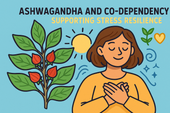
Ashwagandha and Co-Dependency: Supporting Stress Resilience
Stress is more than a feeling—it’s a full-body signal that your system is overwhelmed. When the mind races and the body tenses, your hormones, breathing, and focus all shift into survival mode. Chronic stress doesn’t just affect emotions—it reshapes your nervous system, drains your energy, and clouds your clarity. Learning to understand and manage stress gently is the first step toward peace, balance, and true recovery. 🌿💫
-

Why Co-Dependency Feels Draining: Adrenal Fatigue and Supplements That Help
The adrenal glands are small but powerful organs that sit above your kidneys, acting as your body’s built-in stress managers. They produce hormones like cortisol and adrenaline that help regulate energy, mood, and resilience. When they’re overworked from chronic stress or emotional exhaustion, fatigue and imbalance follow. Supporting adrenal health naturally can help restore calm, energy, and hormonal balance. 🌿⚡
-

The Link Between Anxiety, Co-Dependency, and Natural Support
Anxiety feels like living in constant alert mode—your heart races, your thoughts loop, and your body can’t find peace. It’s the nervous system’s way of preparing for danger, even when none exists. Understanding what’s happening in your mind and body is the first step toward calming the storm and restoring balance. 🌿💫
-

Supplements That Support Dopamine and Serotonin in Co-Dependent Patterns
Serotonin is the neurotransmitter of calm, confidence, and contentment. When it’s balanced, you feel peaceful and emotionally grounded. When it’s low, anxiety, mood swings, and emotional dependence take over. By understanding serotonin’s role in emotional health—and how to support it naturally—you can rebuild inner stability, improve relationships, and cultivate lasting happiness from within. 🌞💫
-

How Emotional Exhaustion in Codependency Impacts the Nervous System
The nervous system is the body’s communication network, connecting the brain to every organ and muscle. It regulates stress, mood, and emotion through a delicate balance of electrical and chemical signals. When overwhelmed, it can become dysregulated—leading to fatigue, anxiety, and emotional imbalance. Understanding how to calm and strengthen the nervous system is key to healing from chronic stress and emotional burnout. ⚡🌿
-

What Is Co-Dependency? The Role of Brain Chemistry and Stress
Stress is more than a feeling—it’s a full-body experience that begins in the brain and ripples through every cell. When cortisol surges and the nervous system stays on alert, your body can’t rest or recover. Over time, this constant tension affects energy, focus, mood, and even immune health. Understanding stress chemistry is the first step toward breaking free from burnout and finding calm again. 🌿
-

Creating a Supplement Stack for Motivation, Energy, and Anti-Procrastination
Motivation is the fuel behind every meaningful achievement—but it’s not just about willpower. It’s a mix of mindset, brain chemistry, and momentum. When energy, focus, and purpose align, action feels natural instead of forced. Learn how to harness motivation as a daily state, not a fleeting feeling.
-

Supplements for Building Consistency and Reducing Chronic Procrastination
Biochemistry is the bridge between biology and chemistry—the science of life at the molecular level. It explains how nutrients, hormones, and neurotransmitters interact to create energy, thought, and emotion. From brain function to muscle movement, biochemistry reveals the invisible processes that sustain health, balance, and vitality.
-

GABA and Procrastination: Supporting Calm Focus for Productivity
GABA is the brain’s natural calming messenger—a neurotransmitter that helps slow mental overactivity and ease stress. When GABA levels drop, focus fades, anxiety rises, and procrastination becomes more likely. By supporting GABA through nutrition, lifestyle, and supplements, you can restore calm clarity, improve focus, and take action with steady, balanced energy.
-

Ashwagandha and Procrastination: Lowering Stress to Improve Action
Science is the language of curiosity and discovery. It helps us understand the hidden patterns behind life, energy, and the universe. Through experimentation and critical thinking, science connects imagination to evidence—turning questions into knowledge. Whether through microscopes, molecules, or minds at work, science represents our endless pursuit of truth and innovation.
-

Neurotransmitters and Motivation: Supplements That Support Drive and Focus
Supplements can do more than boost physical health—they can also enhance mental clarity, focus, and motivation. Nutrients like omega-3s, magnesium, B vitamins, and adaptogens help balance neurotransmitters, stabilize mood, and support brain energy. When combined with good sleep, nutrition, and mindful habits, they can transform how your brain performs under stress.
-

Brain Fog and Procrastination: Supplements for Mental Clarity
Brain fog can turn even simple tasks into mental hurdles. When your thoughts feel slow and unclear, procrastination often follows—making focus and productivity seem impossible. This article explores the biochemical and lifestyle causes of brain fog and reveals the most effective supplements for restoring mental clarity, focus, and sustained energy.
-

The Link Between Low Energy and Procrastination: Can Supplements Help?
Neurochemistry shapes how we think, feel, and act. When neurotransmitters like dopamine, serotonin, and GABA fall out of balance, it can lead to fatigue, anxiety, or lack of motivation—fueling procrastination and low mood. Understanding the brain’s chemical communication system helps us find ways to restore focus, calm, and emotional stability through nutrition, mindfulness, and targeted supplements.
-

Why Do We Procrastinate? The Role of Dopamine and Supplements That Support It
Dopamine is the brain’s motivation messenger—the chemical that fuels focus, reward, and drive. When dopamine levels drop, even simple tasks can feel impossible to start. This article explores how dopamine shapes procrastination, motivation, and mental energy, along with natural supplements and daily habits that help restore balance and get things done.
-

Phosphatidylserine and Stress Reduction for People with BDD
Stress is more than a mental state—it’s a full-body experience that affects hormones, brain chemistry, and emotional balance. For people with Body Dysmorphic Disorder (BDD), constant tension and worry about appearance can overload the nervous system. Learning how stress works and finding ways to calm it is key to breaking the cycle of anxiety and self-criticism.
-

How Antioxidants Like Vitamin C & E Support Mental Health in BDD
Antioxidants are the body’s natural defense against stress and inflammation. For people with Body Dysmorphic Disorder (BDD), oxidative stress can worsen fatigue, anxiety, and emotional imbalance. Nutrients like Vitamin C and E help protect brain cells, boost neurotransmitter function, and support a calmer, clearer mindset—building a stronger foundation for recovery.
-

Ginkgo Biloba and Memory Support for BDD Recovery
Emotional regulation is the foundation of healing from Body Dysmorphic Disorder (BDD). When the nervous system stays in constant overdrive, even small stressors can trigger self-critical spirals. Learning to calm emotional reactivity helps restore clarity, confidence, and a sense of inner balance. By blending mindfulness, nervous system support, and self-compassion, you can retrain your brain to respond—not react—to emotion.
-

Alpha GPC and Cognitive Function in Body Dysmorphic Disorder
Mental fatigue can feel like your brain has hit a wall—thoughts slow down, focus fades, and motivation disappears. For people with Body Dysmorphic Disorder (BDD), chronic overthinking, emotional stress, and constant self-evaluation can deplete mental energy even further. Understanding what causes this cognitive exhaustion is the first step toward recovery—through rest, balanced nutrition, and targeted brain-supporting supplements.
-

N-Acetyl L-Tyrosine and BDD: Supporting Mental Clarity
Chronic stress doesn’t just affect your mood—it reshapes your brain chemistry, weakens focus, and fuels the obsessive thought loops common in Body Dysmorphic Disorder (BDD). Over time, constant cortisol elevation drains mental energy and emotional balance. Learning to recognize and manage chronic stress is essential to restoring mental clarity, self-compassion, and resilience.
-

Chamomile and Lavender for Calming Obsessive Body Image Thoughts
The nervous system is the command center of our emotional and physical world—and in Body Dysmorphic Disorder (BDD), it often operates in overdrive. Understanding how the brain and body communicate under stress reveals why intrusive thoughts feel uncontrollable. Learning to regulate the nervous system through calm practices, nutrition, and supplements helps restore inner balance and emotional safety.
-

Adaptogens for Body Dysmorphic Disorder: Rhodiola, Ginseng, and More
Rhodiola rosea, often called the “golden root,” is an adaptogenic herb renowned for boosting stress resilience and mental endurance. For individuals with Body Dysmorphic Disorder (BDD), Rhodiola may help reduce fatigue, regulate cortisol, and enhance emotional balance. By supporting both mind and body, this powerful plant promotes calm focus, improved mood, and renewed energy to face daily challenges.
-

B Vitamins for Stress Resilience in BDD: Rebuilding Calm from Within
Biochemistry is at the heart of every thought, emotion, and reaction we experience. In Body Dysmorphic Disorder (BDD), chemical imbalances in neurotransmitters like serotonin, dopamine, and GABA can amplify stress and distort self-perception. Understanding the biochemistry behind mood and stress regulation offers a path toward healing—bridging the gap between emotional experience and the body’s molecular balance.
-

Melatonin and Body Dysmorphic Disorder: Restoring Healthy Sleep Patterns
Melatonin, the body’s natural sleep hormone, plays a vital role in helping people with Body Dysmorphic Disorder (BDD) restore healthy sleep cycles. When anxiety and obsessive thinking interfere with rest, melatonin levels often drop, leading to more emotional reactivity and distorted self-perception. This article explores how melatonin works, why BDD disrupts it, and how natural supplementation—combined with mindful routines—can help the brain and body finally find calm at night.
-

Sleep Struggles with BDD: Supplements for Rest and Recovery
When you’re living with Body Dysmorphic Disorder (BDD), restful sleep can feel impossible—but the right supplements can help reset your body’s natural rhythm. From magnesium and L-theanine to 5-HTP and ashwagandha, these nutrients support relaxation, lower cortisol, and enhance melatonin production. This article explores how supplements can calm the mind, ease nighttime anxiety, and promote true restorative sleep for emotional and physical recovery.
-

5-HTP and Serotonin Balance: Could It Help with Body Dysmorphic Disorder?
Anxiety can feel like a storm inside the mind—restless, overwhelming, and hard to control. In people with Body Dysmorphic Disorder (BDD), anxiety often fuels obsessive thoughts and self-criticism, creating a painful cycle of worry and self-doubt. This article explores the biological roots of anxiety, the role of neurotransmitters like serotonin and GABA, and how natural strategies such as mindfulness, supplements, and nervous system regulation can restore calm and mental clarity.
-

Can Ashwagandha Help Ease Stress and Anxiety in Body Dysmorphic Disorder?
Neurotransmitters like serotonin, dopamine, GABA, and acetylcholine are the chemical messengers that shape how we think, feel, and react to stress. In Body Dysmorphic Disorder (BDD), imbalances in these neurotransmitters can amplify anxiety, obsessive thinking, and emotional distress. This article explores how restoring healthy brain chemistry through nutrition, supplements, and mindfulness can help bring clarity, calm, and emotional stability.
-

L-Theanine for BDD: Finding Calm in the Mind
Neurochemistry plays a central role in how we think, feel, and see ourselves. For those living with Body Dysmorphic Disorder (BDD), imbalances in neurotransmitters like serotonin, dopamine, and GABA can intensify anxiety, obsessive thoughts, and emotional distress. This article explores how regulating brain chemistry through supplements, mindfulness, and lifestyle changes can bring the nervous system back into harmony and restore inner calm.
-

Omega-3 Fatty Acids and Body Image Disorders: Supporting Emotional Health
Omega-3 fatty acids do far more than support heart health—they nourish the brain, stabilize mood, and may ease the emotional turbulence tied to body image disorders like BDD. This in-depth article explores how omega-3s regulate serotonin, dopamine, and inflammation, helping individuals reduce obsessive thoughts and rebuild self-acceptance. It also connects nutrition to therapy, mindfulness, and nervous system balance for holistic emotional healing.
-

Magnesium and BDD: Calming an Overactive Nervous System
Magnesium plays a crucial role in calming an overactive nervous system—something people with Body Dysmorphic Disorder (BDD) struggle with daily. This article explores how magnesium supports relaxation, emotional regulation, and stress reduction while diving into the science behind its connection to brain chemistry. It also examines how combining magnesium supplementation with therapy and breathwork can help rebalance the body’s stress response, reduce obsessive thought patterns, and promote lasting nervous system calm.
-

The Gut-Brain Axis and BDD: Why Probiotics Might Matter
The gut and brain are constantly in conversation — and that dialogue may shape how you experience Body Dysmorphic Disorder. By nurturing your microbiome with probiotics, prebiotics, and gut-healing nutrients, you can help rebalance serotonin, calm anxiety, and restore emotional stability from within 🧠🦠.
-
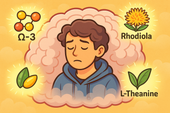
Brain Fog and Body Dysmorphic Disorder: Can Nootropic Supplements Help?
Brain fog often accompanies Body Dysmorphic Disorder, clouding focus and deepening emotional fatigue. Nootropic supplements like L-theanine, Rhodiola, and CoQ10 can help restore mental clarity, balance neurotransmitters, and bring calm energy back to the mind 🌿🧠.
-

How Stress Hormones Like Cortisol May Worsen Body Dysmorphic Disorder
Chronic stress floods the brain with cortisol — the hormone that keeps you on high alert. In Body Dysmorphic Disorder, this chemical overdrive fuels anxiety, distorts self-image, and traps the body in survival mode. Calming cortisol helps restore both peace and perspective 🌿🧠.
-

The Role of Neurotransmitters in BDD—and How Supplements May Help
Neurotransmitters like serotonin, dopamine, glutamate, and GABA shape how people with Body Dysmorphic Disorder perceive themselves. When these brain messengers fall out of balance, perception distorts — but targeted supplements can help restore calm, focus, and emotional regulation 🧠🌿.
-

What Is Body Dysmorphic Disorder? A Deeper Look at the Mind-Body Connection
Body Dysmorphic Disorder (BDD) isn’t just about appearance — it’s about perception. When brain chemistry, trauma, and stress distort self-image, the mind begins to see flaws that aren’t truly there. Healing starts by calming the nervous system and reconnecting mind and body 🪞🧠.
-
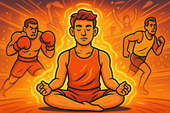
Keeping Calm in Competitive Sports: How to Train Your Mind, Body, and Chemistry for Peak Performance
Competitive pressure can overwhelm even the strongest athletes — but calm is trainable. By combining supplements like magnesium, L-theanine, and adaptogens with breathwork and mindset training, you can stay focused, balanced, and in control under any level of stress 🧠🏅.
-
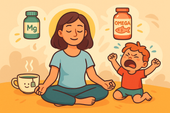
Supplements for Parents Facing Toddler Tantrums: Staying Calm When Little Emotions Run Wild
Toddler tantrums can drain even the most loving parent — but your calm is powerful. With the right supplements like magnesium, L-theanine, and ashwagandha supporting your nervous system, you can stay patient, grounded, and kind, even when emotions run high 🧸🌿.
-

Workplace Stress and Anger Management Support
Workplace stress can quickly turn into frustration — but calm is a skill you can train. By combining supplements like magnesium, L-theanine, and adaptogens with breathwork and mindset tools, you can stay focused, patient, and emotionally grounded no matter how intense the office gets 💼🌿.
-

How to Stay Patient With Family During Stressful Holidays
Holiday gatherings can stir up old stress and test your patience — but calm is possible. With nervous system support from magnesium, L-theanine, and adaptogens, plus mindful breathing and clear boundaries, you can stay centered, kind, and grounded even when family chaos unfolds 🎄💞.
-

Supplements to Keep Calm During Traffic Jams
Getting stuck in traffic doesn’t have to ruin your mood. With calming supplements like magnesium, L-theanine, and ashwagandha, you can train your body to stay relaxed and focused behind the wheel — turning gridlock into a moment of grounded patience 🚗🌿.
-
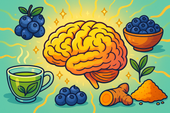
The Role of Antioxidants in Healing Brain Stress from Dissociation
Antioxidants protect the brain from the oxidative stress caused by trauma and dissociation. By neutralizing free radicals and supporting mitochondrial recovery, they help restore clarity, focus, and emotional balance — allowing the mind to heal at the cellular level 🌿🧠.
-
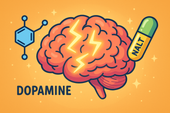
N-Acetyl L-Tyrosine (NALT) for Supporting Mental Clarity
N-Acetyl L-Tyrosine (NALT) fuels dopamine production — the neurotransmitter of focus and motivation. By supporting brain chemistry during stress, NALT helps restore mental clarity, energy, and alertness, making it easier to think clearly and feel present again ⚡🧠.
-

How Ginseng May Improve Focus and Energy in Dissociation
Ginseng helps combat the mental fatigue and fog that often come with dissociation. By supporting mitochondrial energy, balancing neurotransmitters, and regulating cortisol, it gently restores focus, motivation, and emotional presence — helping the mind reconnect with clarity and strength 🌿⚡.
-
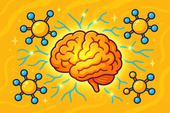
Phosphatidylserine and Dissociation: Supporting Cognitive Function
Phosphatidylserine helps calm the stress response by balancing cortisol, the body’s primary stress hormone. By lowering cortisol spikes, it protects memory, focus, and emotional stability — restoring clarity and mental presence for those struggling with dissociation 🧠🌿.
-
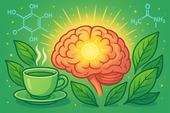
Can Green Tea Extract Help with Dissociative Brain Fog?
Green tea extract may help lift dissociative brain fog by supporting neurotransmitter balance, reducing inflammation, and enhancing energy at the cellular level. With its key compounds EGCG and L-theanine, it promotes calm focus, clarity, and emotional presence — helping you feel more alert and grounded 🍵🧠.
-
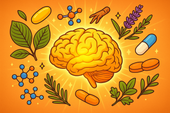
Building a Natural Supplement Stack for Dissociation Support
Building a supplement stack for dissociation means nourishing the brain and body back into communication. By supporting neurotransmitters, gut health, and energy balance through nutrients like magnesium, omega-3s, curcumin, and probiotics, you can help restore clarity, calm, and connection — one layer at a time 🌿🧠.
-

Chamomile and Lavender for Dissociative Anxiety Relief
Chamomile and lavender work together to calm dissociative anxiety by soothing the nervous system and restoring emotional safety. Their natural compounds balance cortisol, enhance GABA activity, and activate the vagus nerve — helping you feel grounded, connected, and at peace again 🌿💜.
-
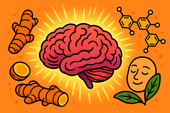
Curcumin for Inflammation and Mental Clarity in Dissociation
Curcumin, the golden compound in turmeric, does more than fight inflammation — it helps clear the mental fog often tied to dissociation. By calming neuroinflammation, balancing neurotransmitters, and supporting mitochondrial energy, curcumin can restore mental clarity, focus, and emotional presence 🌿🧠.
-
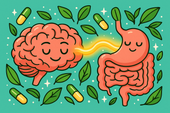
Probiotics and Dissociation: Exploring the Gut–Brain Axis
The gut–brain axis plays a vital role in emotional awareness and presence. When the microbiome is balanced, it supports serotonin production, vagus nerve activity, and calm focus. Probiotics help repair this connection — restoring safety, clarity, and the feeling of truly being in your body again 🌿🧠.
-
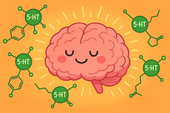
5-HTP for Dissociation: Supporting Serotonin and Emotional Stability
5-HTP helps bridge the gap between emotional numbness and stability by supporting serotonin production — the neurotransmitter that shapes mood, sleep, and sensory awareness. For people experiencing dissociation, 5-HTP may gently restore connection, presence, and emotional balance from the inside out 🌿🧠.

















































